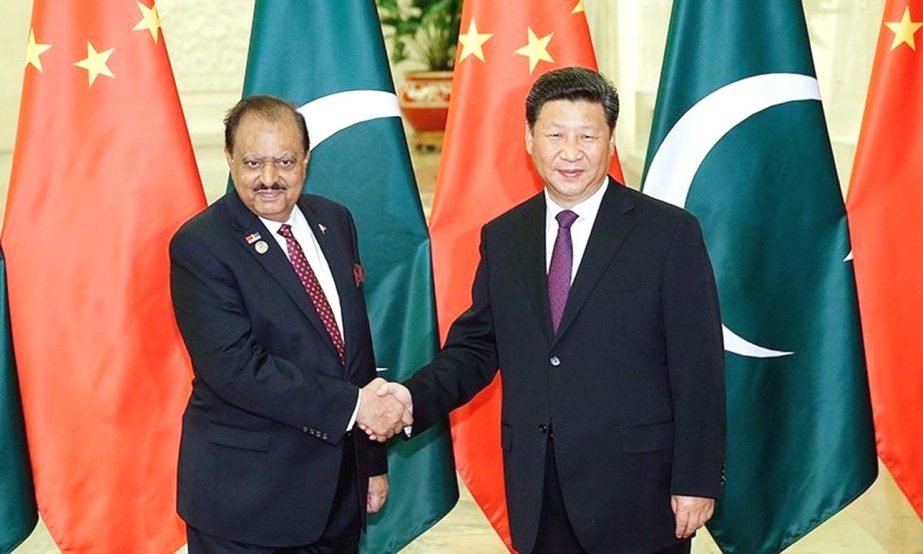
Reuters, Beijing :
Almost all members of the Uighur militant group the East Turkestan Islamic Movement (ETIM) have been eliminated from Pakistan, President Mamnoon Hussain said on Wednesday during a visit to Beijing.
China blames violent unrest in its far western region of Xinjiang on separatist groups like ETIM, who it says want to set up an independent state called East Turkestan and have bases in countries like Pakistan and Afghanistan.
Many foreign experts, however, have questioned whether ETIM exists as the coherent group China claims it is.
Also read: China asks US to help fight Muslim militants in Xinjiang region
Meeting Chinese President Xi Jinping in the Great Hall of the People, President Mamnoon said Operation Zarb-i-Azb “has been successful in eradicating the terrorism from our country”.
“It has also been very helpful in eliminating the ETIM element from our country and I think almost all the ETIM people in our country have been eliminated. Maybe, if they are there, there should be very few,” Hussain said.
Pakistan and China reiterated their commitment to the completion of China-Pakistan Economic Corridor projects in a timely manner.
President Mamnoon said special measures have been taken for the security of Chinese nationals in Pakistan, Radio Pakistan reported.
China and Pakistan are “iron brothers” and always help each other “with great zeal”, he added. The president is in China to attend a military parade marking the 70th end of World War Two in Asia.
Hundreds have died in violence in Xinjiang in the past few years, blamed by Beijing on the militants. Rights groups say the real cause of the unrest is Chinese restrictions on the Islamic faith and culture of the Uighur people who call the region home.
China says ETIM recruits Uighurs who have gone to Turkey and trains them with extremist groups in Syria and Iraq, with the intent of returning to Xinjiang to wage holy war.
During President Xi’s visit to Pakistan in April, Pakistani and Chinese officials signed a series of more than 50 accords to inaugurate the China-Pakistan Economic Corridor, which will create a network of roads, railways and pipelines linking China’s restive west to the Arabian Sea through Pakistan.
The project is part of Beijing’s “Belt and Road” plan to expand its trade and transport footprint across Central and South Asia.
Almost all members of the Uighur militant group the East Turkestan Islamic Movement (ETIM) have been eliminated from Pakistan, President Mamnoon Hussain said on Wednesday during a visit to Beijing.
China blames violent unrest in its far western region of Xinjiang on separatist groups like ETIM, who it says want to set up an independent state called East Turkestan and have bases in countries like Pakistan and Afghanistan.
Many foreign experts, however, have questioned whether ETIM exists as the coherent group China claims it is.
Also read: China asks US to help fight Muslim militants in Xinjiang region
Meeting Chinese President Xi Jinping in the Great Hall of the People, President Mamnoon said Operation Zarb-i-Azb “has been successful in eradicating the terrorism from our country”.
“It has also been very helpful in eliminating the ETIM element from our country and I think almost all the ETIM people in our country have been eliminated. Maybe, if they are there, there should be very few,” Hussain said.
Pakistan and China reiterated their commitment to the completion of China-Pakistan Economic Corridor projects in a timely manner.
President Mamnoon said special measures have been taken for the security of Chinese nationals in Pakistan, Radio Pakistan reported.
China and Pakistan are “iron brothers” and always help each other “with great zeal”, he added. The president is in China to attend a military parade marking the 70th end of World War Two in Asia.
Hundreds have died in violence in Xinjiang in the past few years, blamed by Beijing on the militants. Rights groups say the real cause of the unrest is Chinese restrictions on the Islamic faith and culture of the Uighur people who call the region home.
China says ETIM recruits Uighurs who have gone to Turkey and trains them with extremist groups in Syria and Iraq, with the intent of returning to Xinjiang to wage holy war.
During President Xi’s visit to Pakistan in April, Pakistani and Chinese officials signed a series of more than 50 accords to inaugurate the China-Pakistan Economic Corridor, which will create a network of roads, railways and pipelines linking China’s restive west to the Arabian Sea through Pakistan.
The project is part of Beijing’s “Belt and Road” plan to expand its trade and transport footprint across Central and South Asia.

